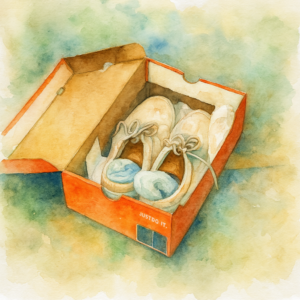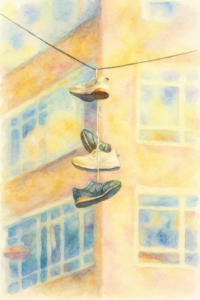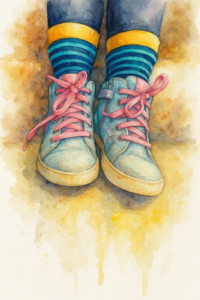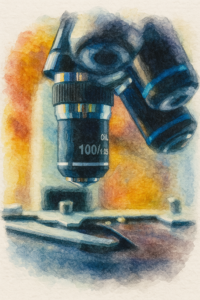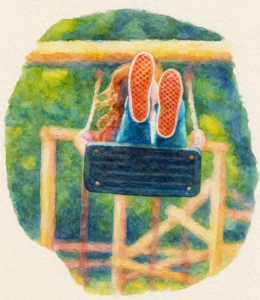Learn French with this clip from Les P’tits Bateaux. Find the full episode here. We do not own the content. The above audio sample and transcription is from Les P’tits Bateaux podcast. We do not own the content. Listen to the entire episode here. pretty much everywhere What’s opening up for you with this clip?…
Start quiz, type what you hear, then join the conversation.
Did you find this one challenging or easy? Did you hear something diffferent? What surprised you? What levels did you complete? Comment below and share what’s opening up for you with this quiz.
Learn French with this clip from Les P’tits Bateaux. Find the full episode here. We do not own the content.
The above audio sample and transcription is from Les P’tits Bateaux podcast. We do not own the content. Listen to the entire episode here.
pretty much everywhere
What’s opening up for you with this clip? Comment below with what was surprising, easy, challenging and/or interesting.
The snippet in English
Find a translation of this snippet here, how much of this did you hear?
Et donc l’idée, c’est de démocratiser la montagne.
Il ne faut pas que ce soit réservé aux membres du Club Alpin — où les guides de montagne ont été très vexés qu’on leur retire cette spécialité, qui était de conquérir la montagne… au risque d’y laisser sa vie !
Quand on fait de l’escalade, il n’y a presque aucun danger —
à part se manger le mur ou la falaise parfois, en tombant… Eh oui, ça peut faire mal ! Salut les matelots !
Les Petits Bateaux. Posez vos questions par note vocale sur l’appli Radio France.
And so the idea is to democratize the mountains.
It shouldn’t be reserved for members of the Club Alpin – where mountain guides were very upset that this specialty was taken away from them, which was to conquer the mountains… at the risk of losing one’s life!
When you’re climbing, there’s almost no danger –
apart from the occasional fall onto the wall or cliff… Yes, it can hurt! Bye, sailors!
Les Petits Bateaux. Ask your questions by voice note on the Radio France app.
The above translation from Deepl
What does “Il ne faut pas que” mean?
Il ne faut pas que — (It must not / should not)
Il ne faut pas que tu sois en retard pour l’entretien.
(You must not be late for the interview.)
Usage notes: Common structure to express prohibition, advice, or necessity in the negative. Always followed by the subjunctive.
Cultural note: Very typical in formal speech, rules, or parental advice. French often softens commands using this structure rather than using direct imperatives.
What does “ce soit réservé” mean?
ce soit réservé — (that this be reserved)
Il faut que ce soit réservé uniquement aux membres.
(It must be reserved only for members.)
Usage notes: Subjunctive form of être used after expressions like il faut que, pour que, etc. Common in formal or polite requests, permissions, or conditions.
Cultural note: The subjunctive is widely used in French to express necessity, doubt, or subjectivity. While learners often find it tricky, it’s essential for sounding natural and grammatically correct in educated or formal contexts.
What does “ont été très vexés” mean?
ont été très vexés — (were very offended / upset)
Ils ont été très vexés par ses remarques.
(They were very offended by his remarks.)
Usage notes: Neutral to slightly formal. Vexé implies hurt pride, annoyance, or feeling insulted — often more emotional than logical. Stronger than fâché in terms of sensitivity.
Cultural note: In French culture, être vexé often relates to subtle social slights or perceived disrespect — not always openly shown, but deeply felt. It’s common in family, friendship, or workplace tensions.
What does “on leur retire” mean?
on leur retire — (we take [it] away from them / [they] are deprived of)
On leur retire leur droit de vote après une condamnation pénale.
(They are stripped of their right to vote after a criminal conviction.)
Usage notes: Neutral/formal. Common in legal, administrative, or institutional contexts. Retirer means to take back or remove, and the indirect object (leur) refers to those affected.
Cultural note: Often used in public discourse about rights, privileges, or responsibilities — e.g. on lui retire la garde des enfants, on lui retire son permis. It conveys loss through external decision or authority.
What does “laisser sa vie” mean?
laisser sa vie — (to lose one’s life)
Il a laissé sa vie dans un accident de montagne.
(He lost his life in a mountain accident.)
Usage notes: Formal or literary. A softer, more poetic way to say mourir (to die), often used in news, memorials, or dramatic contexts.
Cultural note: Frequently used to express tragic or heroic death (e.g. war, sacrifice). More dignified than blunt alternatives.
Similar expressions:
- perdre la vie (to lose one’s life) — neutral/formal
- tomber au combat (to fall in battle) — military or heroic tone
- mourir sur le coup (to die instantly) — specific to sudden deaths
- trouver la mort (to meet one’s death) — often used in journalism
- often more restrained than English expressions like kick the bucket. Here are some French alternatives, ranging from poetic to humorous:
- Euphemistic / softer:
- s’éteindre (to pass away, literally “to go out like a flame”)
Il s’est éteint paisiblement. (He passed away peacefully.) - nous a quittés (left us)
Mon oncle nous a quittés l’année dernière. (My uncle passed away last year.) - partir (to go / to leave)
Elle est partie trop tôt. (She left too soon.) - rendre l’âme (to give up the soul) — poetic
Le vieil homme a rendu l’âme au petit matin. (The old man passed away at dawn.)
- s’éteindre (to pass away, literally “to go out like a flame”)
- Humorous / informal:
- casser sa pipe (to kick the bucket) — old-fashioned, ironic
Il a cassé sa pipe à 90 ans. (He kicked the bucket at 90.) - passer l’arme à gauche (to die, esp. in battle or ironically)
Il a fini par passer l’arme à gauche. (He ended up dying / biting the dust.) - aller au ciel / au paradis (to go to heaven) — often used with kids
- casser sa pipe (to kick the bucket) — old-fashioned, ironic
What does “presque aucun” mean?
presque aucun — (almost none)
Il n’y avait presque aucun touriste en hiver.
(There were almost no tourists in winter.)
Usage notes: Neutral and standard. Used with singular nouns to express a near total absence. Must agree in gender: presque aucune chance, presque aucun bruit.
Cultural note: Common in news, essays, and conversation to highlight rarity or minimal presence — often with a slightly emphatic or dramatic tone.
What does “se manger” mean?
se manger — (to crash into / to take [something] hard, often physically)
Il s’est mangé une porte en sortant trop vite.
(He walked right into a door while rushing out.)
Usage notes: Informal, slangy. Common in spoken French among younger speakers. Often used with an object (se manger un mur, se manger une gifle). Can describe accidents or hard hits, both physical and metaphorical.
Cultural note: This reflexive form adds humor or emphasis, often implying clumsiness or bad luck. It’s especially frequent in urban or youth speech.
What does “la falaise” mean?
la falaise — (cliff)
Ils se sont arrêtés au bord de la falaise pour admirer le paysage.
(They stopped at the edge of the cliff to admire the view.)
Usage notes: Neutral and standard in all contexts. Refers to steep rock faces, especially along coasts or mountains.
Cultural note: Famous French falaises like those of Étretat in Normandy are iconic natural landmarks and often appear in paintings, films, and tourism promotions.
What does “parfois” mean?
parfois — (sometimes)
Parfois, il vaut mieux se taire que de tout dire.
(Sometimes, it’s better to stay silent than say everything.)
Usage notes: Neutral and very common in both spoken and written French. Synonyms include de temps en temps (more informal) and occasionnellement (more formal).
Cultural note: Often used to soften statements or generalize experiences in storytelling, conversation, and even advertising.
What does “en tombant” mean?
en tombant — (while falling / by falling)
Il s’est blessé en tombant dans les escaliers.
(He got hurt while falling down the stairs.)
Usage notes: Formed with en + present participle (gérondif), it indicates how or when something happens. Common in both spoken and written French.
Cultural note: The gérondif structure like en tombant is widely used to show simultaneous actions or cause. It’s considered standard and versatile, often replacing longer causal phrases.
What does “ça peut faire mal” mean?
ça peut faire mal — (that can hurt / it can be painful)
Attention en disant ça — ça peut faire mal.
(Be careful saying that — it can hurt.)
Usage notes: Informal and common in speech. Can refer to physical pain or emotional impact depending on context.
Cultural note: In French, pain is often expressed through faire mal rather than using a direct verb like “to hurt.” This phrase can sound empathetic, cautionary, or even threatening depending on tone.
Wait “salut” means hi and bye?
Yes — salut means both hi and bye in informal French.
Salut, ça va ?
(Hi, how’s it going?)
Bon, à demain — salut !
(Okay, see you tomorrow — bye!)
Usage notes: Very casual, used among friends, peers, or children. Avoid in formal settings like workplaces, with strangers, or older people unless the tone is clearly relaxed.
Cultural note: In France, salut is common for quick greetings and goodbyes. In Quebec, people often prefer Allô for “hi” and Bye (borrowed from English) for “bye,” especially among younger speakers.
What does “les matelots” mean?
les matelots — (sailors)
Referring to “listeners” in this podcast — get it? Because the podcast is called “l’l boats” ?
Les matelots préparaient le navire avant le départ.
(The sailors were preparing the ship before departure.)
Usage notes: Neutral but slightly old-fashioned; often evokes traditional or historical imagery of sailors. For modern contexts, marin is more common.
Cultural note: In French literature and songs, matelot carries a nostalgic or romantic tone, often linked to the navy, sea voyages, or 19th-century maritime life.
What does “l’appli” mean?
l’appli — (the app)
J’ai téléchargé l’appli pour réserver mes billets de train.
(I downloaded the app to book my train tickets.)
Usage notes: Informal abbreviation of l’application. Very common in everyday speech and casual writing. Masculine in full (le logiciel, une application), but appli is feminine: la/le appli → l’appli (fem.)
Cultural note: Widely used in tech-savvy contexts. In France, apps for transport, banking, and food delivery are often referred to simply as l’appli. Formal contexts still use application.
Les P’tits Bateaux Podcast
Official synopsis: Les enfants posent des questions, des spécialistes leur répondent. Jeunes (et moins jeunes !) peuvent poser toutes les questions possibles et imaginables directement par message vocal via franceinter.fr, sauf pendant les vacances.
I recently discovered this podcast from InterFrance and love it. It’s kids posing questions and the host brings in experts to explain. And it’s aimed at young French kids, not French learners. That’s my favorite kind of content. Being for French kids is what makes it so good.
You’ve got real people (a kid, a host, and an expert), all speaking real French — no AI generated stuff here. The kid asks a question, and then an expert explains it in short, clear language. There’s a ton of repetition, natural turns of phrase, and just enough challenge to keep your ears working.
And because it’s meant for French-speaking kids, the adults naturally explain things simply but not condescendingly. You get exposed to rhythm, tone, interjections (bah, ben, alors), and full sentences — but also some real dialogue dynamics. And that’s gold if you’re trying to move from textbook filler to actually speaking and thinking in French.
Improving your French Listening Comprehension with Podcasts
On this site, fast spoken French is finally accessible to all levels. The tool break podcasts into short clips each set to transcription fill-in-the-blank practice. My favorite practice in class is always dictées. While they can seem overwhelming at first, the confidence boost and skills payoff for doing the work pays off. They’re perfect for anyone at any level, from advanced students to those just starting.
We use podcasts and our practice exercises to make it possible for anyone, anywhere to immerse in French with fun and ease. Join us and enjoy French, one short clip at a time. Let’s learn together!
Make the most of the site:
- Daily Podcast Listening: Start your day with a French podcast from our collection. Choose episodes that align with your interests to keep it engaging.
- Active Listening Practice: As you listen, try to pick out key phrases and vocabulary. Use our daily quizzes to test your understanding and reinforce learning.
- Repeat and Shadow: Listen to the same podcast segment multiple times. Try to mimic the pronunciation and intonation to improve your spoken French.
- Note-taking: Jot down new words or phrases you encounter. Review these notes regularly to enhance vocabulary retention.
- Reflect and Respond: After each episode, summarize the main points in French, either in writing or aloud. This helps in consolidating your learning and improving your expressive skills.
- Read More:
- True Beginner or A1 Learners: discover tips learning with podcasts at an introductory level.
- Discover all the podcast clips on FrenchIRL organized by level.
- Top Tips: Here’s how I make the most of my own site.
I created the French In Real Life project because I wanted to understand more than just my teacher and youtubers who cater to learners. I wanted to understand the French I hear in France. I hope you can benefit as much as I have. Become a supporting member for access to all clips.
What’s opening up for you?
Comment below with what’s opening up for you with this clip. What do you love about this? What was challenging? What was easy? Share your learning progress below!
Learn French with this clip from Les P’tits Bateaux. Find the full episode here. We do not own the content. The above audio sample and transcription is from Les P’tits Bateaux podcast. We do not own the content. Listen to the entire episode here. pretty much everywhere What’s opening up for you with this clip?…
Start quiz, type what you hear, then join the conversation.
Did you find this one challenging or easy? Did you hear something diffferent? What surprised you? What levels did you complete? Comment below and share what’s opening up for you with this quiz.


